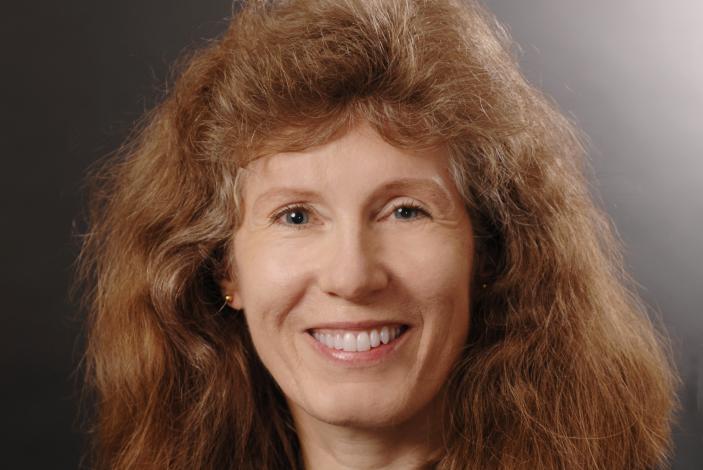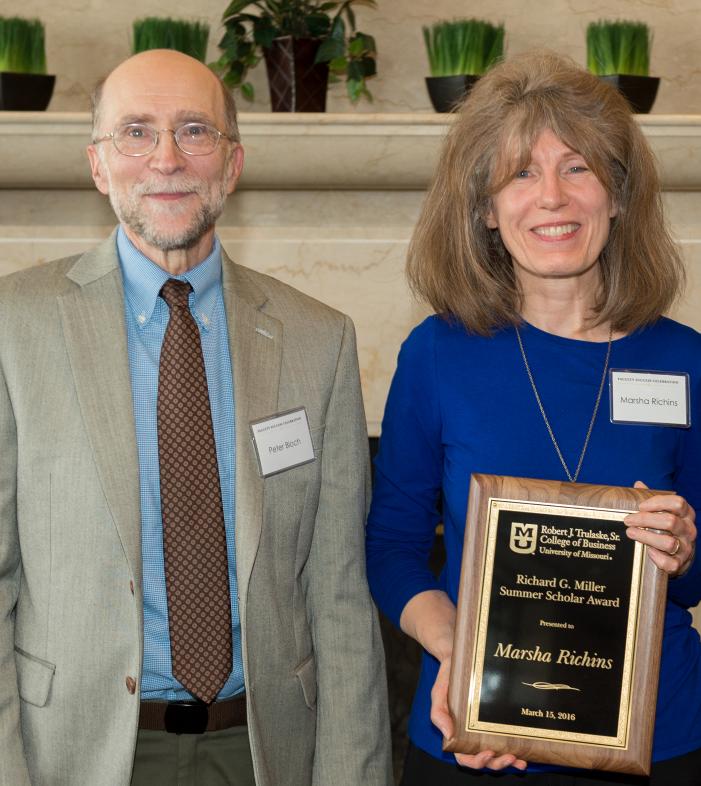
Marketing professor earns top honor in consumer research

By Stephen Schmidt
It was a day in October 2019 like almost all the others that involved working on research and lecture preparation for Marsha Richins, professor of marketing at the Trulaske College of Business. Then the texts came pouring in.
“It was so completely unexpected,” said Richins, who also serves as the Bailey K. Howard World Book Chair of Marketing at Trulaske. “I have never been so surprised by anything in my entire life. And that is absolutely the truth."
She knew the Association for Consumer Research was meeting at its annual conference, this one taking place in Atlanta. What she was unaware of, though, was that the leadership team was in the process of announcing the recipients of its most coveted distinction for 2020: ACR Fellow.
Leading up to that moment, only 30 people in the field of consumer research had ever been nominated since its founding in 1980. Her name was on the list, along with David Mick at the University of Virginia.
Throughout her career, Richins’ findings in academic papers centered on materialism have been highly cited by fellow scholars in the consumer research field — most notably her paper published in the Journal of Consumer Research, “A Consumer Values Orientation for Materialism and Its Measurement: Scale Development and Validation.”
Her work also led to a term being coined in the field: “life transformations” — the idea that consumers often set expectations that certain products will be able to change their lives in meaningful ways.
“Materialism has always puzzled me, because I’m actually not very materialistic,” Richins said. “But people just seem to get so excited about buying stuff and getting stuff and not being that way myself, it's been hard for me to understand that a little bit. So I’ve done a lot of interviews, sitting down and talking with people and finding out.”
The early stages of Richins’ path as a scholar and lecturer would take her all over the country, from Portland State University to Louisiana State University to the University of Massachusetts Amherst. But she has done a majority of her research at the University of Missouri — along with her husband, Peter Bloch, a professor emeritus of marketing at Trulaske.
“She is a very thoughtful and highly intellectual scholar,” said Srinath Gopalakrishna, the Marketing Department chair at Trulaske. “She adds significantly to the department’s reputation in the marketing field. Her work has earned her an enviable reputation as a world-class researcher among consumer behavior scholars.”
Gopalakrishna also pointed out the high level of care put into student learning by Richins, who has also served as the director of the undergraduate and graduate certificates in marketing analytics.
“Marsha is a quiet, but very assertive person,” Gopalakrishna said. “She articulates her views in a systematic manner. I enjoy working with her because she is also a good listener. She integrates diverse viewpoints, while maintaining a sharp focus on the goal or mission of any project.”
Out of all of the teaching-related distinctions Richins has received in her career, the one that stands out the most was being selected by a former student who played on the Mizzou baseball team, Dillon Everett, as an honorary coach for a game in 2013, in which she threw out the first pitch.
Setting a course
Born in Chicago, Richins spent a large part of her childhood in Weaverville, California, a small town settled in the mountains of Northern California as a result of the California Gold Rush in 1850.
As a child, she never envisioned going into the marketing arm of consumer research. She was fascinated, though, by the study of psychology, wanting to know what made people think they way they did.
One of her biggest influences in her high school days was a guidance counselor who sent away for some psychology textbooks for her — to start an academic journey that would eventually lead her all the way to the University of Texas at Austin for an MA in social psychology and later a doctorate in marketing.
“I really credit that counselor a lot for my success in life, because he asked me what I wanted to be when I grow up. I said that I didn't know,” Richins said.
“He had seen my test scores, and he looked at me, he said, ‘You can be anything you want. You can be a doctor if you want.’ And I will always remember him so fondly, because when I grew up, the only thing that women were were mothers, teachers, nurses, or secretaries. That was it.”
A remote audience
The ACR Fellow nomination meant that Richins would be afforded the opportunity to give a speech at the 2020 conference, scheduled to take place Oct. 1-4 in Paris, France — a reality that was halted after the conference had to be fully virtual given the COVID-19 health pandemic.
Richins and Mick were given the opportunity to address their colleagues either in real-time or do a recording. Both chose the latter.
Although she missed being able to address her counterparts in a traditional fashion, Richins did say the alternative way of sharing her thoughts was considerably less stressful. Afterwards, several of her colleagues reached out to correspond via email and catch up, allowing her to still feel connected to those taking part in the event.
“I’ve had a lifetime of pursuing challenging questions, meeting interesting people and working with phenomenal students,” Richins stated at the top of her address.
Later in her address, she mentioned that at times she has been labeled as someone who was “anti-consumption.” She said that was not true.
In October, Richins' speech as a new ACR Fellow was presented virtually due to COVID-19.
“Consumption is an essential support system that allows us to live and thrive,” she told the digital crowd. “Consumption allows us to reach some of our most cherished life goals: to stay alive and be healthy, to be safe and connected to others, and to help our children flourish. It can help us reach the heights of joy, celebrate important milestones, and communicate who we are or want to be.”
She ended her address by asking her fellow consumer scholars to look into ways they could add to the overall improvement of consumption quality for all consumers — especially those with low incomes whose financial troubles have been exacerbated by the COVID-19 health pandemic.
“It would be useful if we, as scholars, could help people find ways to get the satisfactions we get from consumption,” Richins said, “but with non-purchase consumption.”
